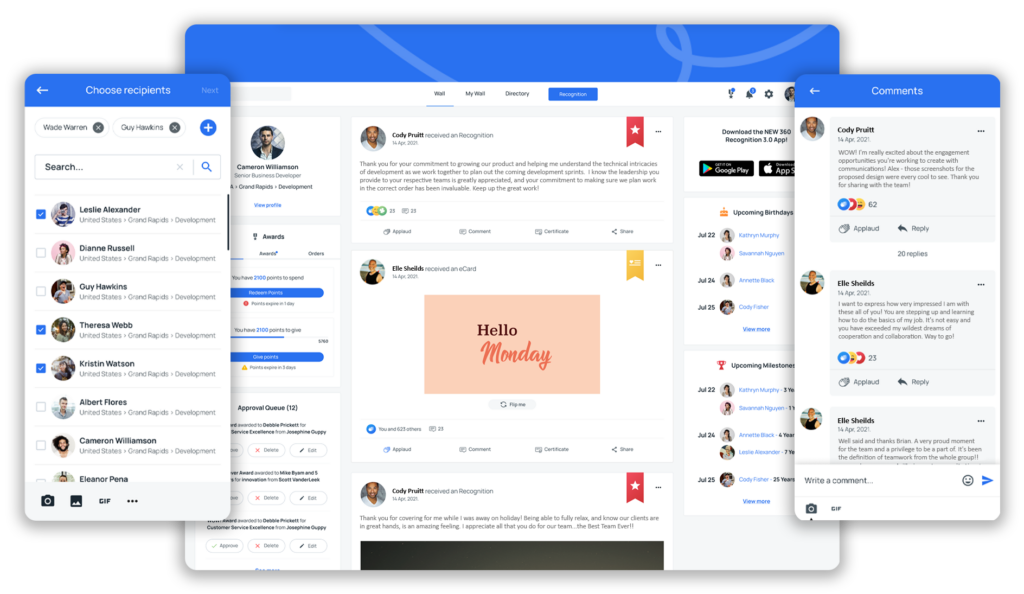September 16, 2022

Gen Z in The Workplace
Two years ago, the world shutdown almost like flipping a switch. One day we went to work and the next, we stayed home. For months (or even years) we worked from home, college kids took classes online, and for many, values shifted.
Now, we’re emerging from the pandemic to a world that’s fundamentally changed. Today, working from home is commonplace, if not expected. And those college kids have now graduated and are entering the workforce.
Managers and leaders may have had plenty to deal with these past few years, but now they also need to learn how to resonate with Gen Z in a work environment that we’re all still learning.
Who Is Gen Z?
While the time frame that classifies Gen Z is debated, they’re generally accepted as people born between the late 90s and early 2010s. Gen Z also constitutes more than a quarter of the population in the US and is the most diverse generation in our nation’s history.
This means the oldest Gen Zers are currently in their early-to-mid 20s, have likely recently graduated college, and are starting their careers. In fact, Gen Z is on track to be the best educated generation so far. Among 18- to 21-year-olds no longer in high school in 2018, 57% were enrolled in a two-year or four-year college. This compares with 52% among Millennials in 2003 and 43% among members of Gen X in 1987.
While prepared for the workplace, Gen Z still has plenty of hurdles to overcome. This generation is entering the workforce at a time with surging inflation, insurmountable student debt, a housing crisis, and a looming recession. Still, Gen Z is notoriously determined to learn and grow in their careers.
Sometimes criticized as “job hoppers,” Gen Z knows what they want and to go after it. They’re challenging the status quo and leaving jobs that don’t offer opportunities to develop their career path. So much so, a LinkedIn survey found that 40% of young workers said they were willing to accept a 5% pay cut to work in a position that offered career growth opportunities.
While it may be easy for managers to assume Gen Z is just like any other new cohort entering the workforce, they may be missing the mark. This group is progressive, smart, and outspoken. They’ve also never worked when a remote or hybrid set up wasn’t an option. So, to engage this generation at work, managers will need to think a bit differently.
Gen Z Values
Understanding some of the values this generation holds will help leaders connect with Gen Z in a meaningful way. This will be critical for building an engaged and resilient team.
We’ve outlined some of the common values found amongst Gen Zers.
1. Mental Health
As mentioned, Gen Z has been hit hard with social, political, and economic crisis – and, of course, a global pandemic. And while this generation is resilient, they’re also disproportionately affected by mental health issues, like anxiety and depression.
In fact, nearly half (46%) of Gen Zers say they’re stressed or anxious all or most of the time. And although Millennials may have been known as the “therapy generation,” studies show that Gen Z is the most likely generation to seek professional mental health treatment.
2. Diversity, Equity, Inclusion
As the most diverse generation, Gen Z tends to be more progressive than previous generations. Unsurprisingly, Gen Zers also see the nation’s growing racial and ethnic diversity as something to be celebrated. They are also more likely to be the children of immigrants than any other generation. Nearly a quarter (22%) of Gen Zers have at least one immigrant parent, compared with 14% of Millennials.
Additionally, they’re more likely to support the LGBTQIA community. So much so, 84% feel either positively or neutrally about gay marriage. This could be due to that fact that a record number of Gen Zers themselves identify as something other than straight – 21%, according to a Gallup poll.
3. Purpose-Driven
While it’s difficult to pinpoint exactly why, this generation tends to be more purpose driven than previous generations. It may be due to growing up with climate change as an ever-present threat. It may be due to their higher rates of higher education. Or it may be due to their exposure to diversity. Likely, it’s a blend of all of this and more.
Specifics aside, Gen Z is a particularly purpose-driven generation. They’re quick to spot inauthenticity in corporations and politicians alike and have been known to organize around an issue quickly. Just look to the climate change protests from 2018 to see how Gen Z cares deeply about socio-political issues and demands action.
4. Flexibility
As mentioned, Gen Zers entered the workforce when work-from-home was typically the default arrangement. This means, while many of us had to adjust to working from home, Gen Z largely knew no other way. So, when companies now are asking people to “return” to the office, much of this generation is doing so for the first time. And they’re not thrilled about it.
In fact, 71% of 18-to 24-year-olds said that they would consider looking for another job if their company insisted on them returning to the office full-time. Whether you agree or disagree with their sentiment, it’s understandable nonetheless. What older generations say Gen Z is missing from being at home, they’ve never experienced in the first place.
5. Instant Gratification
As technology advances at lightning speed, each new generation continues to be even more tech savvy than the last. And Gen Z is no exception. Gen Z is the first generation to not remember a time without the internet. Furthermore, many Gen Zers don’t even remember a world before smartphones.
In fact, 98% of Gen Zers own a smartphone and 55% are on their phones for 5 or more hours a day. They tend to consider desktops and laptops as more of a work tool, and phones are their primary source of technology. Carrying around essentially a minicomputer in their pocket every day, this generation has unsurprisingly come to expect instant gratification and convenience.
How Managers Should Work with Gen Z
Knowing what’s uniquely important to Gen Z will help managers understand how to best lead them. Taking this information and using it to influence leadership tactics will help drive successful, engaged teams.
We’ve outlined some ways to use these values to influence your actions.
Lead with Empathy
Because mental health is so close to Gen Z, to resonate with them, managers will need to lead with empathy, understanding, and transparency.
Since so many Gen Zers are experiencing anxiety, managing in a way that won’t add to that will be important for building trust and engagement. For example, it may seem counter intuitive, but talking about any hardships that may come up within the company will actually calm anxieties and build trust. Your employees will grow to learn that they won’t be blindsided with bad news, and they’re seen as more than just another worker.
Additionally, pay attention to signs of impending burnout. See if you notice employees regularly working through lunch or sending emails in the evening. And although some leaders still believe remote employees don't work as hard, the data shows otherwise. 53% of remote workers say they work more hours now than they did in the office and 63% say they find it more difficult now to "unplug" after hours.
So, set an example. Company culture is determined from the top down. Be sure you have a healthy work/life balance and encourage others to do the same. Remind your employees to unplug at the end of the day and don't send emails after hours. Be careful about who you promote as well. If chronic over-workers are the ones who are "getting ahead," think about the message that sends to other employees.
Also encourage employees to use their PTO - and consider offering more of it. According to Indeed, 36% of all workers say more PTO could help reduce their burnout. Just remember, time off isn't the cure to burnout, it's an additional support. If your culture is toxic, more PTO will just be a band aid.
Furthermore, consider allowing mental health days, starting an employee wellness program, and offering free counseling through an Employee Assistance Program. Talking about how you care about mental wellness won’t mean much to Gen Z if you don’t implement processes to help support mental wellness.
Corporate Social Responsibility
As we’ve mentioned, Gen Z has faced a range of social, political, and environmental hardships. And many have a sense of responsibility to enact positive change. As teens, this meant spending their money at businesses that align with their values. Now that Gen Z is beginning to enter the workforce, this means working for companies that align with their values.
In a study by Deloitte, nearly half (49%) of Gen Zers said they have made choices over the type of work they are prepared to do and the organizations for which they are willing to work based on their personal ethics.
This means companies who are doing the bare minimum won’t cut it for Gen Z.
Furthermore, this generation is also paying attention to who is in leadership positions at your company. And if there’s a lack of diversity, they’re taking note. As the most diverse generation, at least one in five Gen Zers polled said they feel personally discriminated against “all of the time” or frequently because of an aspect of their backgrounds. And more than half see older generations as standing in the way of progress.
This doesn’t stop at in-office dynamics either. They’re also attuned to inauthenticity in marketing as well. So, companies should be aware of how they’re engaging with social movements like Pride Month, Black History Month, and the environment.
Meaning, as tempting as it may be to change your company’s logo to rainbow colors during June, unless the company actively supports the LGTBQIA community year-round through other initiatives, you won’t get Gen Z’s support.
So, if you want to attract this generation to your company as either employees or consumers, it may be time to audit your social responsibility initiatives.
Flexibility
As mentioned, many Gen Zers entered the workforce remotely-and they want to keep it that way.
Remember, this generation is the most tech savvy generation yet. So, where older generations may get frustrated when it comes to dealing with Zoom calls, internet issues, and virtual collaboration, Gen Zers tend to have no qualms. In fact, many simply don’t see the value of requiring work to be done in-office all the time.
One of the main reasons Gen Zers prefer remote work is the ability to work the hours they choose. 9 to 5 may be the standard, but this generation is asking why? They want to work when they feel most productive - not to mention save time, money, and the environment by not having to commute.
Remote work does have some downsides, however. Pew research found that while people may want to continue remote work, 60% of employees feel less connected to their coworkers. And while some people may scoff at the importance put on coworker connection, what may be superfluous to the older generations, could be critical for younger workers.
Oftentimes in new jobs, employees get to shadow a manager or coworker for training - they get to find mentors to help guide them. Casual conversations, quick questions, and impromptu meetings are all perks of office work that Gen Z has missed out on. While it may be too soon to tell how this will impact Gen Zers’ careers long term, we must acknowledge that they’re missing out on what was once a given.
This is why many companies have found a sweet spot in hybrid work. Hybrid models do a great job of bringing the best of both worlds together, while minimizing downsides. A report from Gallup recommends being home three to four days a week and in the office one to two days. However, it will be up to companies to consider all the factors affecting their business and decide which model is best for them.
Give Timely Feedback Often
As the instant gratification generation, it should come as no surprise that Gen Z prefers frequent, immediate, and direct feedback regarding their job performance – both positive and negative.
In the past, research found that the ideal amount of employee feedback is once a week. Today, studies have found that 60% of Gen Zers want multiple check ins from their managers throughout the week. Furthermore, 40% of these people want daily check ins or even multiple check ins throughout the day.
While this may intimidate managers, this “neediness” from Gen Z makes sense.
Research shows this generation is hungry for career growth and development. According to a LinkedIn study, 76% of Gen Zers want more opportunities to move up or increase responsibilities at work. And in order to do so, they need feedback.
This is where a recognition platform could come in handy. An online social recognition platform, like Terryberry’s, can integrate with other platforms, like Slack and Outlook. This helps busy managers meet the needs of Gen Z by giving feedback seamlessly and in a timely manner.
Additionally, an online platform helps reach Gen Z where they are already – their phones. A recognition platform with a phone app keeps Gen Z accessible and engaged. Not to mention, it also helps reach deskless and factory workers.

Conclusion
As Gen Z begins to enter the workforce, they’re bringing with them new and challenging values. From diversity to social responsibility, what was once considered taboo in the office, Gen Z sees as a moral responsibility to uphold.
And while it may be tempting for managers to continue with business as usual, in less than a decade this generation will make up 30% of our workforce. Companies may need to rethink some of their core values if they want to remain competitive.
But leaders who are willing to listen to the changing needs of their employees and take steps towards change will be the ones who see engagement, retention, and morale rise.
Interested in learning more about how your company can benefit from a recognition and wellness program? Schedule a demo of Terryberry's recognition platform today.
